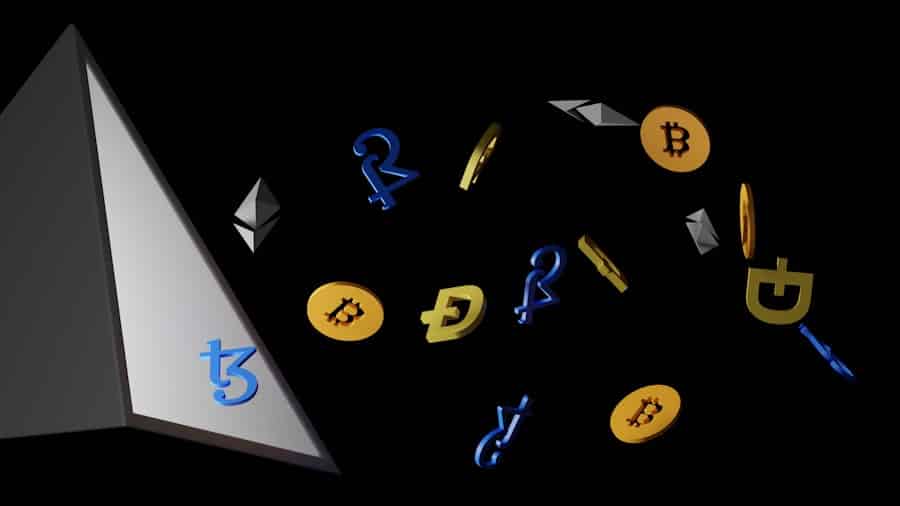Blockchain technology has emerged as a revolutionary force in the digital landscape, fundamentally altering how data is stored, shared, and secured.
This technology was initially developed as the backbone for cryptocurrencies like Bitcoin, but its potential extends far beyond digital currencies.
The decentralized nature of blockchain ensures that no single entity has control over the entire chain, which enhances security and reduces the risk of fraud. Each block in the chain contains a list of transactions, a timestamp, and a cryptographic hash of the previous block, creating an immutable record that is transparent and verifiable. The implications of blockchain technology are vast, particularly in sectors where trust and transparency are paramount.
In online marketplaces, where buyers and sellers interact without physical presence, the need for reliable verification mechanisms is critical. Traditional systems often rely on intermediaries to facilitate trust, which can introduce inefficiencies and vulnerabilities. Blockchain offers a solution by enabling peer-to-peer transactions that are secure and transparent, thereby reducing the need for third-party verification.
As businesses and consumers increasingly seek more reliable and efficient ways to conduct transactions online, understanding the role of blockchain technology becomes essential.
Key Takeaways
- Blockchain technology is a decentralized and secure way of recording transactions and data, making it ideal for online marketplaces.
- Transparency is crucial for building trust in online marketplaces, as it allows consumers to verify the authenticity and integrity of products and transactions.
- Blockchain technology enhances transparency in online marketplaces by providing an immutable and transparent ledger of transactions, reducing the risk of fraud and manipulation.
- Case studies of online marketplaces using blockchain, such as OpenBazaar and BitPesa, demonstrate the potential for increased transparency and efficiency in e-commerce.
- Blockchain technology has the potential to significantly impact consumer trust in online marketplaces by providing a secure and transparent platform for transactions.
The Role of Transparency in Online Marketplaces
Transparency is a cornerstone of trust in any marketplace, particularly in online environments where anonymity can lead to fraudulent activities. In traditional marketplaces, consumers often rely on brand reputation, customer reviews, and third-party certifications to gauge the reliability of sellers. However, these mechanisms can be manipulated or misrepresented, leading to a lack of confidence among buyers.
In an online marketplace, where physical inspection of goods is not possible, transparency becomes even more critical. It allows consumers to make informed decisions based on accurate information about products and sellers. Moreover, transparency fosters accountability among sellers.
When buyers can easily access information about product origins, pricing history, and seller performance, they are more likely to hold sellers accountable for their actions. This accountability can lead to improved seller behavior and higher quality products in the marketplace. For instance, if a seller knows that their transaction history is publicly accessible and subject to scrutiny, they may be less likely to engage in deceptive practices.
Thus, transparency not only enhances consumer confidence but also encourages ethical business practices among sellers.
How Blockchain Technology Enhances Transparency

Blockchain technology enhances transparency in online marketplaces by providing a secure and immutable record of all transactions. Each transaction recorded on a blockchain is time-stamped and linked to previous transactions, creating a chronological history that is accessible to all participants in the network. This level of visibility allows consumers to trace the provenance of products, verify claims made by sellers, and assess the overall reliability of a marketplace.
For example, in industries such as food and pharmaceuticals, where product authenticity is crucial, blockchain can provide detailed information about the supply chain, including where ingredients were sourced and how they were processed. Additionally, blockchain’s decentralized nature means that no single entity controls the data. This democratization of information reduces the risk of manipulation or censorship by any party involved in the transaction.
Smart contracts—self-executing contracts with the terms of the agreement directly written into code—further enhance transparency by automating processes and ensuring that all parties adhere to agreed-upon terms without the need for intermediaries. This not only streamlines transactions but also minimizes disputes arising from misunderstandings or misrepresentations.
Case Studies of Online Marketplaces Using Blockchain
Several online marketplaces have begun to leverage blockchain technology to enhance transparency and build consumer trust. One notable example is Everledger, a digital registry that uses blockchain to track the provenance of diamonds. By recording each transaction on a blockchain, Everledger provides buyers with verifiable information about the diamond’s origin, ownership history, and any certifications it may have received.
This transparency helps combat issues such as conflict diamonds and fraud while giving consumers confidence in their purchases. Another compelling case is OpenBazaar, a decentralized marketplace that allows users to buy and sell goods directly with one another using cryptocurrencies. OpenBazaar utilizes blockchain technology to facilitate transactions without relying on traditional payment processors or intermediaries.
Each transaction is recorded on the blockchain, providing an immutable record that enhances trust between buyers and sellers. The platform also incorporates reputation systems based on user feedback, further promoting transparency and accountability within the marketplace.
The Impact of Blockchain on Consumer Trust
The integration of blockchain technology into online marketplaces has profound implications for consumer trust. As consumers become more aware of the potential for fraud and misinformation in digital transactions, they increasingly seek platforms that prioritize transparency and security. Blockchain addresses these concerns by providing an unalterable record of transactions that can be independently verified by all parties involved.
This level of assurance significantly boosts consumer confidence in their purchasing decisions. Moreover, as consumers engage with platforms that utilize blockchain technology, they are likely to develop a stronger sense of loyalty towards those platforms. When buyers feel secure in their transactions and trust that they are receiving accurate information about products and sellers, they are more inclined to return for future purchases.
This loyalty can translate into long-term relationships between consumers and marketplaces, ultimately benefiting both parties through repeat business and positive word-of-mouth referrals.
Challenges and Limitations of Implementing Blockchain in Online Marketplaces

Despite its numerous advantages, implementing blockchain technology in online marketplaces is not without challenges. One significant hurdle is scalability; as transaction volumes increase, maintaining speed and efficiency can become problematic. Many existing blockchain networks struggle with processing large numbers of transactions quickly due to their consensus mechanisms.
For instance, Bitcoin’s proof-of-work system can lead to delays during peak usage times, which could frustrate users seeking immediate transaction confirmations. Additionally, regulatory uncertainty poses another challenge for online marketplaces adopting blockchain technology. Governments around the world are still grappling with how to regulate cryptocurrencies and blockchain-based transactions effectively.
This lack of clear guidelines can create hesitancy among businesses considering blockchain integration due to fears of potential legal repercussions or compliance issues. Furthermore, educating both consumers and sellers about how blockchain works is essential for widespread adoption; without proper understanding, users may be reluctant to engage with new technologies.
Future Potential of Blockchain in Online Marketplaces
The future potential of blockchain technology in online marketplaces is vast and multifaceted. As more businesses recognize the benefits of transparency and security offered by blockchain solutions, we can expect an increase in adoption across various sectors. Innovations such as decentralized finance (DeFi) could further transform how transactions are conducted by enabling peer-to-peer lending and borrowing without traditional financial institutions acting as intermediaries.
Moreover, advancements in interoperability between different blockchain networks could pave the way for seamless transactions across multiple platforms. This would allow users to transact with greater ease while maintaining the benefits of transparency and security inherent in blockchain technology. Additionally, as artificial intelligence (AI) continues to evolve alongside blockchain solutions, we may see enhanced data analytics capabilities that provide deeper insights into consumer behavior and market trends.
The Advantages of Blockchain for Transparency in Online Marketplaces
The advantages of blockchain technology for enhancing transparency in online marketplaces are clear and compelling. By providing an immutable record of transactions that can be independently verified by all parties involved, blockchain fosters trust between buyers and sellers while promoting ethical business practices. As case studies demonstrate, platforms leveraging this technology can significantly improve consumer confidence and loyalty.
While challenges remain regarding scalability and regulatory frameworks, ongoing innovations suggest a promising future for blockchain in online marketplaces. As businesses continue to explore this transformative technology, we can anticipate a shift towards more transparent, secure, and efficient online shopping experiences that benefit both consumers and sellers alike. The journey towards fully realizing the potential of blockchain is just beginning, but its impact on transparency in online marketplaces will undoubtedly shape the future of commerce as we know it.
Blockchain technology is revolutionizing the way online marketplaces operate by enhancing transparency and security. This article discusses how blockchain is being utilized to create a more trustworthy environment for buyers and sellers alike. For more information on cutting-edge technology, check out this article on Smartsender: Your Chatbot Platform for Seamless Customer Interactions.
FAQs
What is blockchain technology?
Blockchain technology is a decentralized, distributed ledger that records transactions across many computers in such a way that the registered transactions cannot be altered retroactively.
How does blockchain enhance transparency in online marketplaces?
Blockchain enhances transparency in online marketplaces by providing a secure and immutable record of transactions. This allows for greater trust between buyers and sellers as all transactions are recorded and cannot be altered.
What are the benefits of using blockchain in online marketplaces?
Some benefits of using blockchain in online marketplaces include increased transparency, reduced fraud, lower transaction costs, and improved security. Additionally, blockchain can help to streamline processes and reduce the need for intermediaries.
How does blockchain prevent fraud in online marketplaces?
Blockchain prevents fraud in online marketplaces by providing a secure and transparent record of all transactions. This makes it difficult for fraudulent activities to occur as all transactions are recorded and cannot be altered.
Can blockchain technology be integrated into existing online marketplaces?
Yes, blockchain technology can be integrated into existing online marketplaces through the use of smart contracts and decentralized applications. This allows for the benefits of blockchain to be realized without the need for a complete overhaul of the existing marketplace infrastructure.

